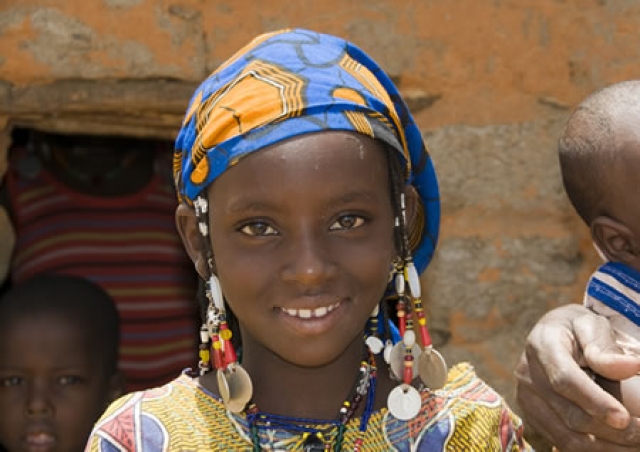African nations come together to spread the immunization message
 BRAZZAVILLE/DAKAR/NAIROBI, 22 April 2013 - Reaching more people and strengthening immunization on the continent is the aim of the third African Vaccination Week (AVW) being celebrated from 22–28 April 2013 under the theme “Save lives. Prevent disabilities. Vaccinate!”
BRAZZAVILLE/DAKAR/NAIROBI, 22 April 2013 - Reaching more people and strengthening immunization on the continent is the aim of the third African Vaccination Week (AVW) being celebrated from 22–28 April 2013 under the theme “Save lives. Prevent disabilities. Vaccinate!”
All 46 Member States of WHO in the African Region are expected to push the message that it is the right of all to be protected from vaccine-preventable diseases and have access to public health services.
In the past decade, good progress has been made in Africa. Far more people are being immunized and there has been marked reduction in mortality rates from preventable diseases. With measles, the adoption of reduction strategies has resulted in a decrease of 89% in the estimated mortality compared to 2000 levels.
By the end of 2012, 30 countries had been validated as having eliminated maternal and neonatal tetanus. All countries but one have introduced Hepatitis B and Hib vaccines and the introduction of newer vaccines such as pneumococcal conjugate vaccine and rotavirus vaccines is being scaled up.
Despite this remarkable progress, an estimated 8.4 million infants in the African Region did not receive their DTP3 (diphtheria, pertussis and tetanus) vaccination by their first birthday in 2011. Additionally, outbreaks of vaccine-preventable diseases continue to occur due to low population immunity and a lack of security in some places continues to pose problems.
In addition, lack of qualified staff and adequate resources needs to be addressed. There is an urgent need for trained staff, equipped with proper tools, to reach and successfully carry out vaccination activities in remote areas. Governments need to collaborate at the national, regional and district levels to ensure an effective and successful implementation of the Reaching Every District (RED) approach. Another challenge to address is the program shortfalls; in routine immunization, completion of vaccination cycle is imperative. Shortfall either in funding, motivation or staff support can reverse initial efforts.
Addressing these challenges will require innovative and effective solutions in which advocacy, education and communication are central. Accordingly, the African Vaccination Week is being launched in Kampala, Uganda on April 27. The launch will coincide with the formal introduction of the pneumococcal conjugate vaccine into Uganda’s national routine immunization schedule.
“We are delighted with the high and growing profile of the African Vaccination Week which is yet another opportunity for us to underscore the proven life-saving power of vaccines, and to encourage vaccination of children, adolescents and adults against deadly diseases”, says WHO Regional Director for Africa, Dr Luis Sambo.
Immunization prevents illness, disability and death from vaccine preventable diseases such as diphtheria, measles, pertussis, pneumonia, polio, rotavirus diarrhea, rubella and tetanus. Vaccines have the power not only to save but also transform lives, giving children a chance to grow up healthy, go to school and improve life prospects.
“Vaccination represents one of the best health investments parents and governments can make for their babies and children,” said Manuel Fontaine UNICEF’s Regional Director for West and Central Africa. “Too many children in Africa are still at risk from illness, death and disability. The message for this generation is simple - seize the opportunity to banish these threats and vaccinate!”
WHO, UNICEF and partners are dedicated to reaching more people with immunization and reducing illnesses and deaths from vaccine-preventable diseases.
About WHO
WHO is the directing and coordinating authority on international health within the United Nations system. With people working in over 150 countries, WHO is responsible for providing leadership on global health matters, shaping the health research agenda, setting norms and standards, articulating evidence- based policy options, providing technical support to countries and monitoring and assessing health trends. In addition to medical doctors, public health specialists, scientists and epidemiologists, WHO staff include people trained to manage administrative, financial, and information systems, as well as experts in the fields of health statistics, economics and emergency relief, working together to ensure better health for all. For more information, please visit: www.who.int
About UNICEF
UNICEF works in 190 countries and territories to help children survive and thrive, from early childhood through adolescence. The world’s largest provider of vaccines for developing countries, UNICEF supports child health and nutrition, good water and sanitation, quality basic education for all boys and girls, and the protection of children from violence, exploitation, and AIDS. UNICEF is funded entirely by the voluntary contributions of individuals, businesses, foundations and governments. For more information about UNICEF and its work, visit: www.unicef.org
Media Contacts
For more information, please contact:
Sam M. Samuel T. Ajibola, WHO Regional Office for Africa, Brazzaville, Tel: +47-241-39378 –Mobile: + 242 066537022 - e-mail: ajibolas [at] afro.who.int (ajibolas[at]afro[dot]who[dot]int)
Laurent Duvillier, UNICEF West & Central Africa - Tel: +221 338 69 76 42 - Mobile: +221 77 637 66 04 - email: lduvillier [at] unicef.org (lduvillier[at]unicef[dot]org)



